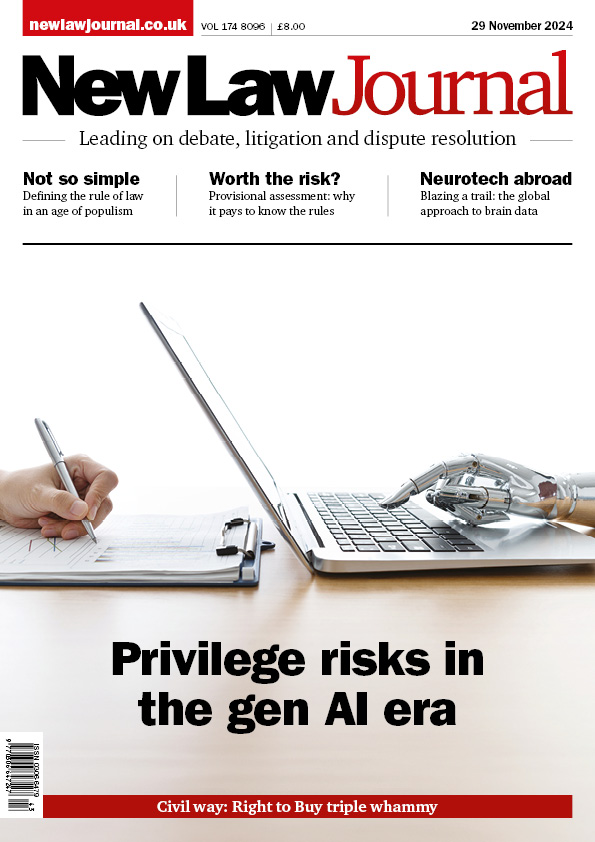THIS ISSUE

Is it bye bye Right to Buy? In this week’s 'Civil Way', former district judge Stephen Gold looks at changes to the discounts for secure tenants.
Prisons are in crisis, so what’s the plan to fix them? In this week’s NLJ, Helen Scambler, associate at Mishcon de Reya, comments on the government’s actions to date to repair the issue, and makes some suggestions on what they could do next.
Donald Trump, populism and the UK Attorney General Richard Hermer KC’s (pictured) recent speech on the rule of law are explored in former JUSTICE director Roger Smith’s NLJ column this week.
How does legal privilege apply to the use of generative artificial intelligence (gen AI) by lawyers? In this week’s NLJ, Olivia Dhein, knowledge lawyer at RPC, and Ben Roe, lead knowledge lawyer at Baker McKenzie, highlight some overlooked risks and consider various workplace scenarios.
How does UK law on neurorights compare to protections granted in other parts of the world? Part 4 of Harry Lambert and Bradley John-Davis’s fascinating series on neurotechnology and the law looks at neurotech law abroad, suggests the UK may be lagging behind, and explains that Latin America is leading the way.
It does proponents of the rule of law no harm to admit to its many uncertainties: Roger Smith warns against the temptation to oversimplify
Does the existence of a suitable alternative remedy rule out the option of judicial review? Nicholas Dobson weighs up the Supreme Court’s view
Successful non-party costs orders against credit hire operators are swelling in number: Sarah Jane Cartlidge considers whether these are just a drop in the ocean
How will the government reduce the prison population and ease the strain on the system? Helen Scambler examines the proposed measures
Olivia Dhein & Ben Roe explain how lawyers should think about privilege when using gen AI tools
MOVERS & SHAKERS

Keystone Law—Milena Szuniewicz-Wenzel & Ian Hopkinson
International arbitration team strengthened by double partner hire

Coodes Solicitors—Pam Johns, Rachel Pearce & Bradley Kaine
Firm celebrates trio holding senior regional law society and junior lawyers division roles

Michelman Robinson—Sukhi Kaler
Partner joins commercial and business litigation team in London
NEWS
The government has pledged to ‘move fast’ to protect children from harm caused by artificial intelligence (AI) chatbots, and could impose limits on social media as early as the summer
All eyes will be on the Court of Appeal (or its YouTube livestream) next week as it sits to consider the controversial Mazur judgment
An NHS Foundation Trust breached a consultant’s contract by delegating an investigation into his knowledge of nurse Lucy Letby’s case
Draft guidance for schools on how to support gender-questioning pupils provides ‘more clarity’, but headteachers may still need legal advice, an education lawyer has said
Litigation funder Innsworth Capital, which funded behemoth opt-out action Merricks v Mastercard, can bring a judicial review, the High Court ruled last week







